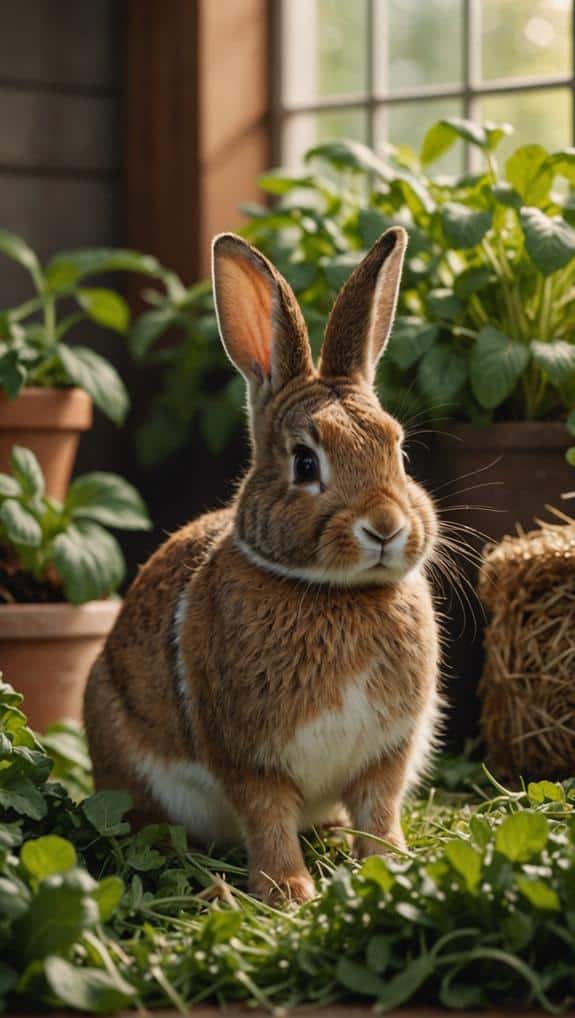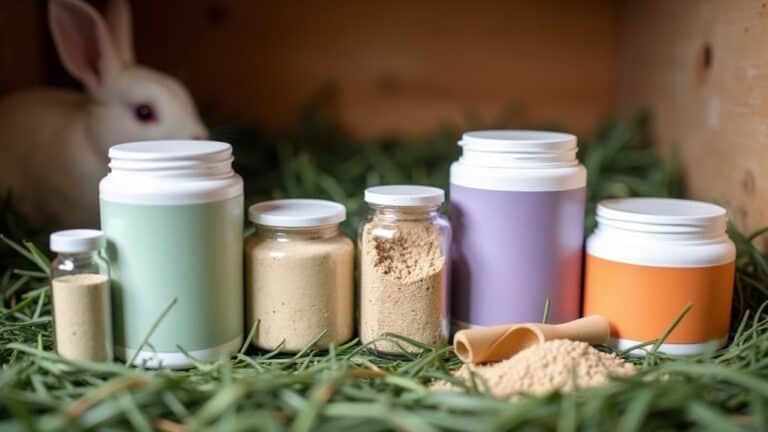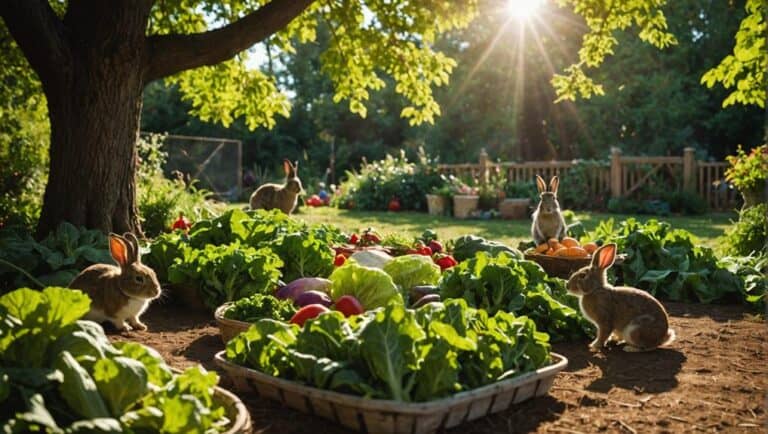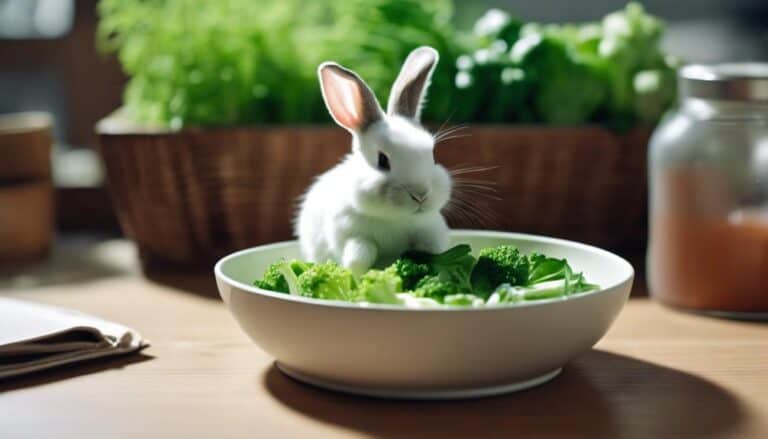Nourishing your young bunny is vital for their growth and well-being, and understanding their dietary needs at each stage is essential. From their early reliance on mother’s milk to the gradual introduction of hay and pellets, the right nutrition supports their development. You might think it’s straightforward, but the shifts require careful attention to guarantee they’re getting the nutrients they need. As you consider their changing diet, you’ll discover key factors that can notably impact their health and happiness. What should you focus on as they grow? As young bunnies transition to solid foods, it’s crucial to introduce a variety of fresh greens while being cautious of their digestive sensitivities. Many new bunny owners overlook the importance of gradual changes and might not realize the nutrition mistakes new bunny owners make, such as offering too much fruit or not providing sufficient fiber. By educating yourself on the proper dietary progression, you’ll ensure your furry friend enjoys a balanced and healthy diet that fosters their overall well-being.
Contents
Newborn Rabbit Nutrition

Newborn rabbits depend entirely on their mother's milk for essential antibodies and nutrients during the first few weeks of life. This milk is vital for their immune system and overall health, guaranteeing they thrive in those early days.
Around 2-3 weeks, you can begin the solid food introduction; at this stage, baby bunnies typically start nibbling on hay, which aids in their digestive development. It's important to shift them carefully, as changing to a healthy diet helps prevent digestive upsets.
As they reach approximately 7 weeks old, providing alfalfa hay becomes critical, as it's protein-rich and supports their growth. If you encounter orphaned baby bunnies, it's important not to feed them cow's milk. Instead, opt for kitten formula or goat's milk, administering it through syringe feeding if necessary to make sure they receive proper nutrition.
During the weaning process, fresh water must always be available, as hydration is essential when altering their diet from milk to solids.
Diet for Young Rabbits
As young rabbits shift from their mother's milk to solid food, their diet plays an essential role in their growth and health.
For baby rabbits, starting at 2-3 weeks old, you should introduce hay into their diet, gradually increasing its importance by 6 weeks. During this shifting phase, observing bunny habitats and behavior can help you understand their nutritional needs better.
At 7 weeks, alfalfa hay becomes vital due to its high protein content, and providing unlimited access is encouraged until they shift to Timothy or other grass hays later.
Alongside hay, young bunnies need a diet that includes high-quality pellets and a gradual introduction of fresh leafy greens. This approach helps minimize the risk of digestive issues that can arise from sudden dietary changes.
Always keep an eye on their droppings; soft droppings or changes in quantity can signal potential health problems requiring immediate attention.
Transitioning to Adult Diet

Shifting your young rabbit from a diet designed for growth to one suited for adulthood is an important step in their development. Around six months of age, you'll want to begin altering their diet to meet their changing nutritional needs.
Start by gradually reducing high-protein alfalfa-based pellets and introducing timothy-based pellets, which are more appropriate for adult digestion. During this change, it's essential to monitor food intake closely, as controlling portion sizes is imperative to prevent obesity and digestive issues while ensuring your bunny has constant access to hay.
Hay should remain the primary component of their diet, providing the fiber important for healthy digestion. Incorporate a variety of grass-based hays along with limited fresh greens to keep their meals interesting and nutritionally diverse.
Remember, make these dietary changes gradually to avoid any abrupt shifts that might upset their stomach. Maintaining a steady supply of their previous diet for a few days will help minimize digestive stress.
Nutritional Components for Growth
The nutritional components essential for the growth of young bunnies play an important role in their overall development and health. During the initial weeks, baby rabbits rely on their mother's milk for essential antibodies and nutrients.
By 2-3 weeks, you can start introducing solid foods. Alfalfa hay is important for young rabbits due to its high protein content, supporting their rapid growth until they reach about six months of age.
Afterward, shifting to quality grass hays like timothy or meadow hay is necessary to maintain health.
In addition to hay, providing limited amounts of high-quality alfalfa pellets—about ¼ cup per 2 lbs of body weight daily—ensures their nutritional needs are met.
Daily access to fresh, leafy greens is also essential; aim for 1-2 cups per 4 lbs of body weight for hydration and essential nutrients.
As your bunny adapts to solid foods, it's important to monitor droppings and appetite closely. This careful observation can help you identify any dietary issues early on, ensuring your little companion enjoys healthy growth and thrives in their new diet.
Monitoring Health and Wellness
Monitoring your young bunny's health and wellness is imperative for guaranteeing they thrive during their formative months. Start by regularly checking their weight to confirm they maintain a healthy growth rate. You want their bones to be noticeable but not sharp to the touch.
Daily observation of droppings is essential; cocoa puff-shaped droppings indicate good health, while any changes in size or quantity may signal dietary or health issues.
Keep an eye on your bunny's energy levels and appetite, as significant decreases can indicate stress, digestive problems, or illness, which require immediate veterinary attention. Hydration is crucial, so make certain your bunny always has access to fresh water. Dehydration can lead to serious complications, so regular checks are necessary.
Conduct routine health checks, looking for signs such as soft droppings or overconsumption of fresh foods. These may signify an imbalance in their diet and necessitate diet adjustments.
Final Thoughts
In summary, nurturing your young bunny through each growth stage is vital for their health and development. While some might worry about the complexity of their dietary needs, remember that a gradual shift and attentive monitoring can simplify the process. By providing the right balance of hay, pellets, and fresh greens, you're setting the foundation for a happy, thriving rabbit. Stay informed and compassionate in your approach, and your bunny will flourish as they grow.






